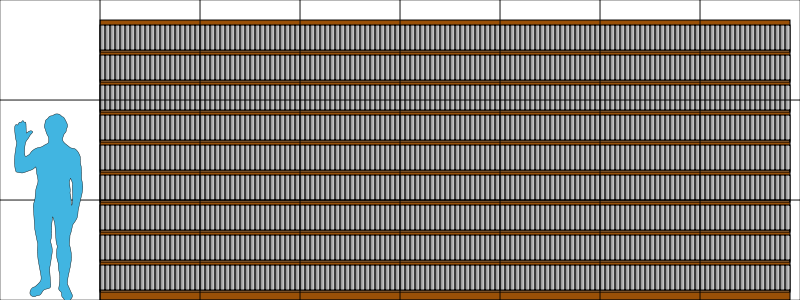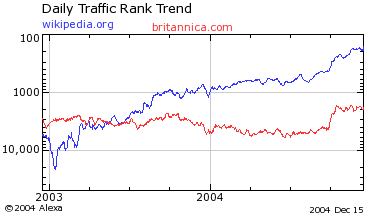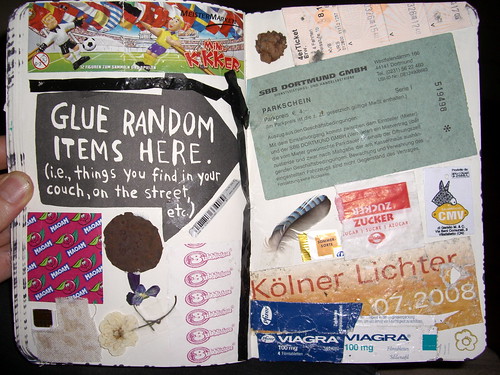Participation
"...we will routinely prefer a shareable amateur source to a professional source that requires us to keep the content a secret on pain of lawsuit. (Wikipedia's historical advantage over Britannica in one sentence.)" -- Clay Shirky
There's this photo...
And how is it like:
"In the days before machinery men and women who wanted to amuse themselves were compelled, in their humble way, to be artists. Now they sit still and permit professionals to entertain them by the aid of machinery. It is difficult to believe that general artistic culture can flourish in this atmosphere of passivity." - Aldous Huxley, 1927
Yet can the word "passivity" be used to accurately describe modern web culture?
(Via http://thru-you.com/)
The case for open education could be summed up as "what works on the web"...
Using volumes 25cm high and 5cm thick (some 400 pages), each page having two columns, each columns having 80 rows, and each row having 50 characters, ≈ 6MB per volume. As English Wikipedia has around 7.5GB of text (August 2007, length of wikitext counted by myself) ≈ 1250 volumes. Note that this is a conservative estimate, as it doesn't include images, tables etc. which take up more surface than the text which describes them.
UBC case study: Adventures in Wikipedia
- Murder, Madness, and Mayhem Project Page - the work of UBC Professor Jon Beasley-Murray, (Wikipedia Page, Blog)
- Article: El Señor Presidente
- The FA Team
Why does this work appeal so much?
- fast, cheap, and out of control...
- augments traditional literacy with new media literacy
- results in genuinely useful public knowledge resources (perhaps the essence of open education resources)
- students will respond to tasks that are authentic
Brian just loves his blog: http://blogs.ubc.ca/brian
- To narrate his work
- To connect with communities...
- To pose problems and get answers...
Notable UBC Blogs:
- Courseblogs - http://blogs.ubc.ca/etec522/
- Parsia (Student-Directed Seminar) - http://blogs.ubc.ca/parsia/
- UBC Blogsquad - http://blogs.ubc.ca/blogsquad/
More featured blogs on homepage...
Resource sites run on blog platform
- LEAP - http://leap.ubc.ca
- Digital Tattoo - http://digitaltattoo.ubc.ca/
Elsewhere
- essential works from Alan Levine: 50 Web 2.0 ways to tell a story, Amazing Stories of Openness
Openness
Open licensing
- Creative Commons
- on Flickr
- via Google Advanced Search (usage rights)
Originality is overrated

One of the certain effects of the electronic age is that it will forever change the values that we attach to art. In fact, the vocabulary of aesthetic criteria that has been developed since the Renaissance is mostly concerned with terms that are proving to have little validity for the examination of electronic culture. I refer to such terms as "imitation," "invention," and, above all, "originality," which in recent times have implicitly conveyed varying degrees of approval or censure, in accordance with the peculiarly distorted sense of historical progression that our age has accepted, but which are no longer capable of conveying the precise analytical concepts they once represented.
Electronic transmission has already inspired a new concept of multiple-authorship responsibility in which the specific concepts of the composer, the performer, and, indeed, the consumer overlap. ...It will not, it seems to me, be very much longer before a more self-assertive streak is detected in the listeners participation, before, to give but one example, "do-it-yourself" tape editing is the prerogative of every reasonably conscientious consumer of recorded music (the Hausmusik activity of the future, perhaps!). And I would be most surprised if the consumer involvement were to terminate at that level. In fact, implicit in electronic culture is an acceptance of the idea of multilevel participation in the creative process.
-- From "Strauss and the Electronic Future," 1964
The urgency
SOCRATES: But there is something yet to be said of propriety and impropriety of writing.
... The specific which you have discovered is an aid not to memory, but to reminiscence, and you give your disciples not truth, but only the semblance of truth; they will be hearers of many things and will have learned nothing; they will appear to be omniscient and will generally know nothing; they will be tiresome company, having the show of wisdom without the reality. -- Plato's Phaedrus
"When copies are super abundant, they become worthless."
"When copies are super abundant, stuff which can't be copied becomes scarce and valuable." -- Kevin Kelly, Better than Free
"Embracing the social means embracing the abundant - and emphasizing instead the way an organization might actually help people on the periphery generate value for themselves." -- Douglas Rushkoff, Real social
|
|







